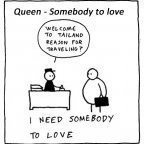Khmer Rouge-Era Rape Cases Remain Taboo, and Justice Elusive
-
Recently Browsing 0 members
- No registered users viewing this page.
-
Topics
-
-
Popular Contributors
-
-
Latest posts...
-
-
31
Out in the woods: Too much humidity in our Thailand jungle now?
I have not noticed any increase in humidity , maybe something to do with all the rain we have been getting 😂... around the house I only wear a sarong ,and we only have fans ,as I don't like A/c ,but I have 24 of them in rental properties ,and they are the bane of my life.. OP try taking some clothes off regards Worgeordie -
1
Thai - Cambodia Conflict Thai Army Confirms Renewed Cambodian Shelling on Strategic Border Zones
Phanom Dong Rak - can confirm that there is artillery fire from both sides. Following OPSEC rules, will not disclose where and how many various vehicles made a U-Turn on my lawn...won't ask for compensation either. -
104
Thai - Cambodia Conflict Thai - Cambodia clash escalates dramatically, atleast 12 dead.
You need to stay away from the yaba or else have your head examined. -
8
Thai - Cambodia Conflict Thailand Condemns Cambodia (Video)
Get you facts right before posting No, Thaksin Shinawatra's daughter is not married to Hun Sen's son. Thaksin's daughter, Paetongtarn Shinawatra, is married to Pitch Pongsawat -
341
The Thumbs Down Syndrome
I'm fair at math, but can't figure out how you calculated that. Little help please.- 1
-

-
-
Popular in The Pub













Recommended Posts
Create an account or sign in to comment
You need to be a member in order to leave a comment
Create an account
Sign up for a new account in our community. It's easy!
Register a new accountSign in
Already have an account? Sign in here.
Sign In Now